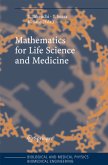The body contains many cellular systems that require the continuous production of new, fully functional, differentiated cells to replace cells lacking or having limited self-renewal capabilities that die or are damaged during the lifetime of an individual. Such systems include the epidermis, the epithelial lining of the gut, and the blood. For example, erythrocytes (red blood cells) lack nuclei and thus are incapable of self-replication. They have a life span in the circulation of about 120 days. Mature granulocytes, which also lack proliferative capacity, have a much shorter life span - typically 12 hours, though this may be reduced to only two or three hours in times of serious tissue infection. Perhaps a more familiar example is the outermost layer of the skin. This layer is composed of fully mature, dead epidermal cells that must be replaced by the descendants of stem cells lodged in lower layers of the epidermis (cf. Alberts et al. , 1983). In total, to supply the normal steady-state demands of cells, an average human must produce approximately 3. 7 x 1011 cells a day throughout life (Dexter and Spooncer, 1987). Common to each of these cellular systems is a primitive (undifferentiated) stem cell which replenishes cells through the production of offspring, some of which proliferate and gradually differentiate until mature, fully functional cells are produced.








